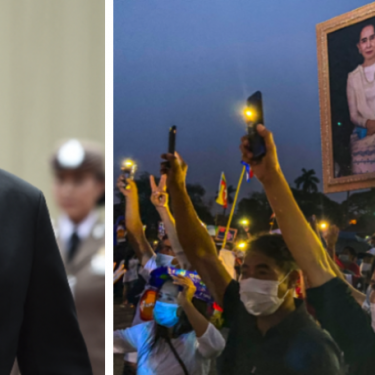Thai premier, UN rapporteurs asked to prevent journalists being returned to Myanmar

Reporters Without Borders (RSF) is very concerned about the fate of three journalists and two press freedom activists who fled from Myanmar to neighbouring Thailand and who are now facing possible deportation back Myanmar, where their lives would be in danger.
RSF calls on Thai Prime Minister Prayut Chan-o-cha to prevent their deportation and has asked three UN special rapporteurs – on freedom of opinion and expression, on Myanmar and on torture – and the Office of the UN High Commissioner for Human Rights (OHCHR) to intercede with the Thai authorities.
The three journalists and two press freedom activists were arrested on 9 May during a routine police check in Chiang Mai, a big city in northern Thailand near the Myanmar border. Charged with entering the country illegally, they could now be deported back to their country of origin, where the military seized power in a coup on 1 February and are conducting an increasingly bloody crackdown.
The journalists work for Democratic Voice of Burma (DVB), an independent media group producing TV and radio programmes, which prefers not to name them for security reasons. The journalists covered the coup d’état and the ensuing pro-democracy demonstrations until 8 March, when the military junta suddenly rescinded the licences of DVB and four other leading independent media outlets.
DVB was thereafter forced to terminate all activities within Myanmar but its journalists continue to cover the situation from neighbouring countries including Thailand, as they were forced to do during the previous military government a decade ago.
Flee or suffer
Originally created in 1991 by Burmese expatriates based in Chiang Mai and the Norwegian capital, Oslo, to “provide accurate and unbiased news to the people of Burma” (as Myanmar was then called), DVB has been targeted with particular intensity in the past two months and, of the 50 media workers currently detained in Myanmar, five are DVB journalists.
One of them, Min Nyo, sustained an injury to his face at the time of his arrest and was sentenced to three years in prison today. Another, DVB cameraman Thura Soe, was arrested on the evening of 24 April by ten soldiers, who fired shots outside his Yangon home.
At least three other DVB journalists, include the well-known anchor Ye Wint Thu, are on a list of wanted journalists for whom arrest warrants have been issued. They are facing up to three years in prison under Section 505 A of the penal code for disseminating information contrary to the interests of the armed forces.
“In the current context of arbitrary imprisonment and extreme violence against the country’s journalists and civilians, sending journalists back to Myanmar would constitute a serious threat to their freedom and security,” said RSF editor-in-chief Pauline Adès-Mével. RSF has appealed urgently to Prime Minister Prayut Chan-o-cha for Thailand “to apply the principle of non-refoulement, as his country undertook to do when it ratified the United Nations Convention against Torture”. Under the principle of non-refoulement, refugees cannot be sent back to a country where they risk persecution, torture or mistreatment or where their lives or freedom are seriously threatened.
RSF has also asked the UN special rapporteurs on freedom of opinion and expression, on Myanmar and on torture, and the Office of the UN High Commissioner for Human Rights (OHCHR) “to intercede with the Thai authorities so that they grant protection and asylum to these journalists.”
Many journalists have fled Myanmar as a result of the ban on independent media and the military’s persecution of media personnel, while those that have stayed in order to continue covering events are being hounded by the junta. Live rounds have been fired at journalists while they were covering protests, some are the subject of arrest warrants, some have seen their homes searched, some have been abducted, and some have been tortured while held by the military.
As of today, the 100th day since the coup, the death toll from the military crackdown is 783 and several thousand people are being detained, according to Myanmar’s Assistance Association For Political Prisoners (AAPP).
Myanmar is ranked 140th out of 180 countries in RSF's 2021 World Press Freedom Index.



